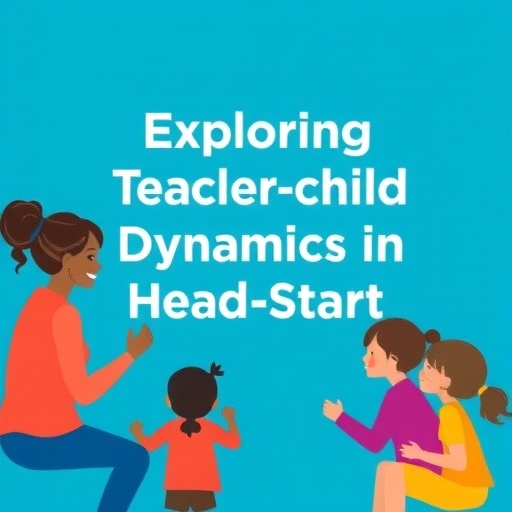In the realm of early childhood education, the dynamics of teacher-child relationships are pivotal for fostering a nurturing and effective learning environment. A groundbreaking study led by researchers Chen, Phillips, and Zhang provides deep insights into the intricate relationship dynamics within Head Start programs. This research not only highlights the importance of children’s gender and behavioral patterns but also examines the often-overlooked factor of teachers’ job stress, making it a significant contribution to the field of early childhood education.
The research conducted in various Head Start programs reveals that teacher-child relationships significantly impact children’s learning and emotional development. Good relationships between teachers and children foster a secure attachment, leading to improved educational outcomes. This study explores the varying ways in which children’s gender can influence relational dynamics, providing novel insights that could shape training methodologies for educators in the long term.
Children’s behavior plays a crucial role in their interactions with teachers. The research elaborates on how undesired behaviors, which can manifest in various forms such as defiance or withdrawal, can alter the perception of teachers towards individual children. These behaviors not only challenge the effective implementation of educational programs but may also affect the emotional well-being of both teachers and children within the classroom environment.
Moreover, the study dives into the significant impact of teachers’ job stress, an often underreported aspect of the education system. High levels of stress among teachers can lead to detachment and even burnout, which could inhibit their ability to form positive relationships with their students. By understanding the interplay of these facets, the research emphasizes the need for systemic changes within educational frameworks that prioritize teacher well-being alongside student engagement.
An additional focus of the research finds its roots in the gender dynamics at play in teacher-child interactions. The authors argue that societal perceptions of gender often influence both teachers’ expectations and their responses to children’s behaviors. This reveals the pressing need for teachers to engage in self-reflection and bias training to foster equitable treatment in their classrooms, allowing for each child to receive personalized attention that aligns with their individual needs.
Through qualitative and quantitative methods, the researchers gathered data from various Head Start settings. They discovered that teachers who were more emotionally attuned to their students could more effectively manage classroom behavior and foster engagement. Conversely, stress levels often led to an increased likelihood of punitive measures in response to undesired behaviors, which could inadvertently strain student-teacher relationships further.
The study suggests that proactive strategies focusing on stress management and behavior regulation can greatly improve the classroom environment. Educators equipped with skills to cope with job-related stress can focus more on building strong connections with their students. This creates a supportive atmosphere conducive to learning and emotional development, where teachers feel empowered rather than overwhelmed.
Furthermore, this research proposes that systematic training programs should be developed to include skills related to understanding gender dynamics, behavioral management, and stress relief techniques. Teachers armed with this knowledge are more likely to navigate the complexities of their roles effectively, ultimately benefitting the children under their care.
This compelling study urges stakeholders, including policymakers and educational leaders, to reconsider the training and resources provided to teachers within early childhood education programs. By investing in comprehensive training that tackles the multifaceted nature of teacher-child relationships, educational systems can cultivate environments where both teachers and students thrive.
The findings of this study also illuminate the importance of community support systems. When teachers are backed by adequate resources, mentoring programs, and collaborative networks, their resilience is strengthened, encouraging better practices in the classroom. This holistic approach could lead to sustainable improvements in teacher-student dynamics that ripple throughout educational systems.
As schools and educational authorities move forward, it becomes crucial to implement strategies that prioritize mental health and interpersonal relationships among educators. The understanding gained from Chen, Phillips, and Zhang’s research presents a clarion call for a paradigm shift in how teacher training and support systems are structured within early childhood education.
The potential implications of these insights extend beyond the classroom, with the promise of nurturing future generations equipped with better emotional and social skills. Research has consistently shown that positive teacher-child relationships not only enhance academic achievements but can also play a pivotal role in shaping children’s psychological well-being into adulthood.
In conclusion, the research conducted by Chen, Phillips, and Zhang serves as an essential resource for advancing our understanding of the teacher-child relationship dynamics in Head Start programs. By examining the interplay of children’s gender, undesired behavior, and teachers’ job stress, this study offers vital strategies that could redefine the quality of early childhood education.
Subject of Research: Teacher-Child Relationships in Head Start Programs
Article Title: Understanding Teacher-Child Relationship Dynamics in Head Start: The Roles of Children’s Gender, Undesired Behavior, and Teachers’ Job Stress.
Article References:
Chen, S., Phillips, B.M. & Zhang, Q. Understanding Teacher-Child Relationship Dynamics in Head Start: The Roles of Children’s Gender, Undesired Behavior, and Teachers’ Job Stress.
Early Childhood Educ J (2025). https://doi.org/10.1007/s10643-025-01945-4
Image Credits: AI Generated
DOI: 10.1007/s10643-025-01945-4
Keywords: Teacher-child relationships, Head Start, children’s gender, undesired behavior, teacher job stress, early childhood education, classroom dynamics.




